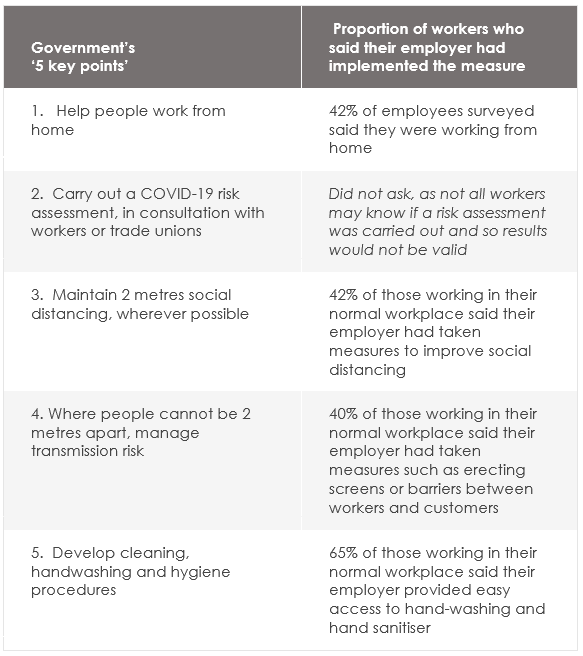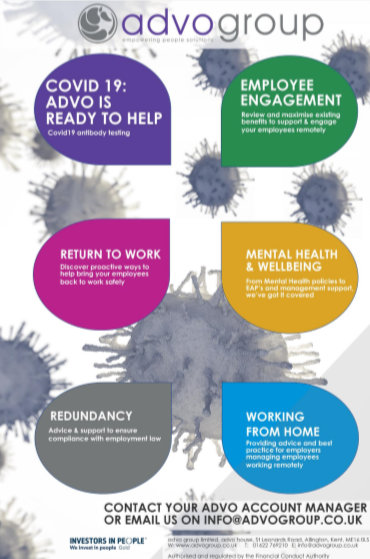Half of workers are feeling positive about a return to work, but of those who do not believe their employer will do enough to make their work environment safe say they won’t return.
49% of employed British adults feel positive about the prospect of returning to their place of work after lockdown, with less than one in five (18%) feeling negative, a study from leading insurer, Aviva shows*.
The findings paint a relatively positive picture for businesses that have supported their people through lockdown, such as regularly communicating with workers and taking necessary steps to manage the risk of infection in the workplace. However, where businesses have not embraced risk management and prevention strategies, employees may decide not to return to work at all.
Further, it is clear from the Aviva study that there is a long way to go before businesses are compliant with the practical guidance from the government to make work safe for employees and customers.
Safety first
The survey of more than 2,000 employed adults working in the UK found that 61% of those returning to work believe their employer will make the work environment safe to return to. However, in a clear warning to businesses that don’t put safety first, the survey found that 35% of employees returning to work don’t trust their employer to make the workplace safe and may not return to work for their employer.
Top concerns for employees returning to work
For workers who feel neutral or negative about returning to work, infection remains workers’ top concern as they come back to their place of work. Whether from colleagues (44%) or customers (33%), employees are most concerned about virus transmission in the workplace, which underscores the need for employers to embrace clear prevention strategies to protect their people and the public.
By Age
Coronavirus has affected everyone in different ways, depending on a number of factors including age, industry, and geography. For example, only 29% of 16 – 24 year olds said they were concerned about the risk of being infected by colleagues, compared to 44% across all age groups. Infection concerns increased consistently by age group, with those over 55 most concerned (49%).
Conversely, employees over 55 were the least concerned about the impact of lockdown on their mental health (7%). This compares to 21% of young employed people who said the changes under lockdown affected their happiness.
However, the biggest concern facing young people returning to work is confusion and a lack of communication over social distancing (39%). Underscoring the importance of communication, young people were also the most critical of communication from their employer, with just 14% rating communication with their employer as ‘excellent’ – well below the average response of 25% who rated employer communication as ‘excellent’.
The confusion voiced by young people in the Aviva survey shows that employers have a clear need to regularly communicate with all of their workers about their return to work and to keep them informed of the safest ways of working, including how to manage social distancing in the workplace.
Chris Andrews, Head of Risk Management Solutions at Aviva, commented: “As Britain gets back to business after lockdown, employees want to know that their employers have taken all the necessary steps, and what those steps are. That means not just taking action but engaging with employees on their concerns and clearly communicating what is in place and addressing anything that remains unresolved.
“Risk management and prevention strategies, once perceived as red tape, are now essential for businesses in order to keep their people and their customers safe as they open their doors again. Whether devising safe working conditions in a factory, or ensuring orderly social distance in a retail setting, businesses need to consider how they will minimise the risk of infection for their employees and their customers.”
How have businesses made work safer?
In the Aviva’s survey of 2,000 employed UK adults, who were asked about attitudes towards returning to work, 42% spent lockdown working from home, 26% continued to work in their usual place of business, 21% were furloughed and 6% continued to work in different locations in a key trade (e.g., plumber, electrician, etc.). A further 5% were not working and not on furlough.
Of the workers that continued to work in their usual place of business, or continued to work at different locations, 80% said that their employer had taken some steps to improve their safety, and the safety of customers entering the premises.
The top three changes implemented by businesses were easy access to hand-washing and hand sanitiser (65%), reducing the number of employees and/or customers allowed in the workplace (50%) and sign-posting traffic flow through the premises to support social distancing (42%).
While welcome, this shows that many businesses still have a long way to go to fully comply with the government’s five point plan for safely returning to work and being Covid-Secure. Below we’ve compared the government’s plan against how many employees said their employer had taken these measures:
Comparison of government plan against how many employees said their employer had taken these measures

Andrews from Aviva continued, “It’s good to see from our survey that most employees say their employer has brought in some of these measures. But it is equally clear that not enough businesses are following all five basic points of the government’s guidance for employers. The risk of not adopting the government’s measures is the spread of the virus, a return to lockdown either locally or nationally and long-term impacts to UK PLC. We must not let that happen.”
“Many businesses may have very specific operational requirements, and expert advice may be the best course of action for them. We encourage businesses to seek expert risk management advice as they emerge from lockdown to ensure they are taking the necessary steps to protect people. Not only will this build confidence amongst employees and customers, but it will equally minimise the risk of infection and related claims for liability.”
advo has been helping clients to return to the workplace. If you would like to know more about how advo can help then in the first instance email us on info@advogroup.co.uk to start a conversation.

Notes:
*Data is taken from a survey of 2,024 employed adults (aged 16+) across the UK, conducted by Censuswide Research from 26 – 30 June 2020, on behalf of Aviva.
You can read the Aviva press release in full here.


